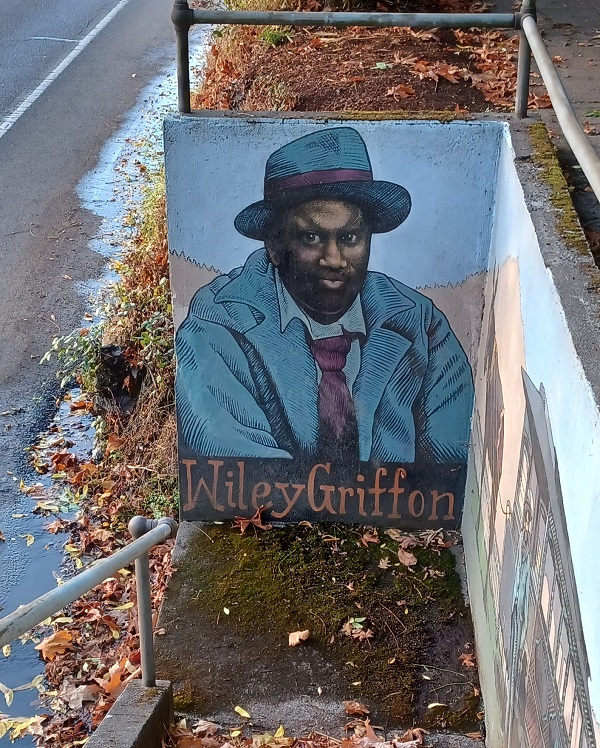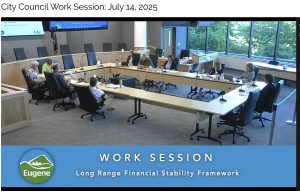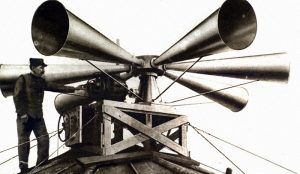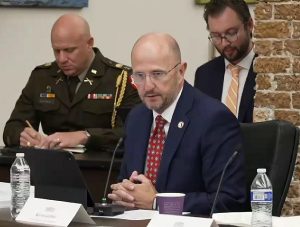Public comments challenge portrayal of Eugene as racist ‘sundown town’
16 min read
A dispute over the portrayal of racism in Eugene history escalated Oct. 8 with reports of a criminal complaint and a request to refrain from personal attacks during public comment.
Commissioner Laurie Trieger (Lane County, July 16, 2024): On July 16, 1949, Lane County obtained a court order demanding specific areas in the neighborhood, currently known as ‘Across the Bridge,’ to be vacated within 10 days of that notice.
[00:00:28] The court order required the razing of a small number of homes in an area delineated by certain riverfront streets to make way for construction of a new Ferry Street bridge. These were the homes of Black families who had created a strong supportive community there.
[00:00:43] On Aug. 24, 1949, a bulldozer entered the neighborhood, the Ferry Street Village, and razed all of the homes in the area, as well as the neighborhood church.
[00:00:54] Although many of the dozens of residents were prepared, many escaped with only the possessions they were able to rescue in a few minutes. Most of the residents were displaced to three new sites in the boundaries of the city of Eugene where there was often no water, electricity or sanitary services.
[00:01:17] David Igl (Lane County, July 30, 2024): I’m David Igl. I was appalled by what I saw this past week in terms of this ‘apology’ for the white racism that led to the shutting down of the North Bank Village. The problem is, the story people have been told is absolute nonsense.
[00:01:33] This fake history about these evil white racists who drove away these happy people on the north bank—it would take some time to go into all the misrepresentations of history, but the key thing is the basic story you were told and that Commissioner Trieger was apologizing for, never happened.
[00:01:55] The authentic history of the North Bank settlers were quite simple. We had the Great Depression, followed by World War II. We had a 15-year period in the United States where there was grossly inadequate residential housing being built. As a result, there was an acute housing shortage that went on for years across the country.
[00:02:17] In 1952, when my parents moved here, my father had a great job, college-educated, and as my mother said, the only reason they could rent a house was because he knew somebody.
[00:02:29] The area, the North Bank Settlement, was not a happy place. It was unsanitary. Just one quick quote. Rodent Control Officer Donald Dickey commented: It’s a potentially serious rat problem. Going to such natural breeding grounds as nearby wood piles, open garbage, the ground, nearby chemical works, and the general trash about the area.
[00:02:55] The problem was, in addition to that, this whole area was a floodplain. And until the mid-60s, this whole area in Eugene (flooded). The airport would be closed. Schools would be closed. You can see pictures of kids riding around their bicycles under, you know, with a bunch of water.
[00:03:12] That area flooded out in February of 1949, and the head of the Lane County Red Cross was very complimentary to the mayor of the city of Eugene, because of his coordination of evacuation efforts and finding housing for the people there.
[00:03:28] The story about all this hatred and racism, destroying a wonderful community that never existed, is not appropriate and apologies need to be made to this community now for what’s been done this past week. I’ve given you a lot of information. I’ll send you more. You can have it right out of the newspaper. I didn’t make this stuff up.
[00:03:51] Please take action on this.
[00:03:57] David Igl (Lane County, Aug. 6, 2024): I’m David Igl. The fiasco of using county funds for a memorial based on falsified history really offends me.
[00:04:07] What’s been in the news lately about the North Bank is just, I find appalling. Referencing the Eugene Weekly: ‘In the 1940s, building within Eugene city limits was illegal for any person of color per local legislation.’ There’s a problem. That’s absolute nonsense.
[00:04:26] ‘Back then, any person of color could not purchase land in Eugene due to deed restrictions, intimidation, and sundown racism, where nonwhites were excluded through violence, intimidation, and discriminatory laws.’ Oh, again, absolute nonsense. Wiley Griffon died in 1913, a homeowner.
[00:04:44] In May of 1948, the U.S. Supreme Court invalidated all property covenants based on race, etc. They’re not enforceable.
[00:04:53] The Lane County Board of Commissioners offered a formal apology for actions they took 75 years ago… What’s going on? This is public money, this stuff is nonsense. I’ve documented everything I’m referring to and more, and I’ve sent it to you, and the county needs to take actions to withdraw support for this kind of nonsense.
[00:05:15] David Igl (Lane County, Aug. 20, 2024): I’m appalled by what I’ve seen recently in terms of the, what’s come out of many government officials on the disgraceful smearing of the people of this community in terms of the North Bank / Ferry Street Bridge community.
[00:05:30] The history that’s been presented is completely fraudulent. There was a national housing crisis. Some individuals were allowed, a racially-mixed group was allowed to live there. And then when the bridge was built, they had to move. The area was a cesspool of ugliness, of alcoholism, of being flooded out, disease.
[00:05:56] In 1949, they were flooded out before the thing was taken down. Had they been there later in the year, they would have been flooded out again. The mayor of Eugene helped arrange for their evacuation and housing for them. This story about all these racist people and this fake history about, ‘We had statutes that prevented Black people from living here, Eugene was a sundown town.’
[00:06:20] I mean, really. I mean, it just falls apart upon the most basic analysis. The Mims got their home, for example, in the ‘40s. Did the police come at 5 or so every afternoon and say, ‘Sun’s going down, you have to move out, but you can come back in the morning.’ I mean, it’s just nutty, the stuff that’s being put out.
[00:06:39] And you have no business supporting this kind of stuff. It’s really ridiculous. Well, Wiley Griffon was here. When he died in 1913, he had been a resident for over 20 years. He owned his own home. I mean, this stuff, it just goes on and on and on. Mabel Byrd lived here in 1917-1919 when she was a student at the University of Oregon. I mean this stuff is just ridiculous.
[00:07:12] David Igl (Eugene City Council, Sept. 11, 2024): David Igl. The Ferry Street Bridge community fiasco. Here are some highlight examples of the outrageous lies being promoted…. Building within Eugene city limits was illegal for any person of color for local legislation. This statement is a blatant lie. Blacks have lived in Eugene for over 125 years…
[00:07:33] ‘According to an ongoing investigation, the five families attempted to take advantage of federal homestead laws, which allowed them to claim the land as their own without cost after homesteading for three years.’ The timeline was getting close to take advantage of the Homesteaders Act, says Ron Stockman, and that’s why they said you’ve got to get them out of there.’
[00:07:52] ‘We recognize that deep injustice was inflicted upon these families and that there are long-lasting impacts on them and their descendants,’ County Commissioner Chair Lori Trieger said. ‘We must reflect and atone.’
[00:08:06] Lori Trieger is an uneducated, ignorant, truly sad non-Oregonian. Federal homesteading applied only to federal lands, not to county lands. And there was no county homesteading provision. This is only more horse hockey pucks.
[00:08:30] Commissioner Laurie Trieger (Ferry Street Village commemoration, Sept. 15, 2024): I am Laurie Trieger and I am deeply grateful to the organizers and supporters for creating this event today and for the opportunity to confront a critical and painful moment in our community’s history.
[00:08:43] And I thank you humbly for including me. Seventy-five years ago on Aug. 24, 1949, the Ferry Street Village, Lane County’s first Black neighborhood, was obliterated under the directive of Lane County government. This wasn’t just any demolition. It was a deliberate act rooted in systemic racism. It uprooted the lives of countless African American families who had settled here, striving to build a future against overwhelming odds.
[00:09:17] Today, those of us here must face the harsh reality of how decisions like this one, made by those with power and influence, have caused generational harm. And we must continue to face those realities, no matter how difficult, if we are ever to break these generational historical cycles. I want to take a moment to share a personal reflection about how I understand the magnitude of this event.
[00:09:45] I am Jewish, and my mother was born in Germany in 1928. She fled the Nazis, being evacuated to England at the age of 12, and eventually immigrated to New York, becoming a U.S. citizen in 1949. She was uprooted from all that was familiar. She lost her home, her land, her language, and some of her family. So while today I stand here as your County Commissioner, I am also here in solidarity with you as one who knows the power and the weight of generational trauma and grief and loss.
I also know the power of historic solidarity, including that between the Jewish people and the Black Americans during the Civil Rights Movement, a movement my mother eventually became deeply involved in and committed to, and that is also something of hers I carry with me and offer to you today.
[00:10:42] The destruction of the Ferry Street Village is a glaring example of how public policies rooted in discrimination continue to reverberate throughout generations. This is not merely some historical footnote, but a living wound that has left enduring scars on so many of our neighbors. Let’s be clear, this community was dismantled as part of a broader strategy to push Black residents out of Eugene.
[00:11:12] As we stand here, we must do more than just acknowledge the past. We must confront it with urgency and sincerity and a commitment to ensuring that such injustice never happens again. How can we do this? Well, first, by understanding that policy can be a tool of oppression or a tool of justice. How we employ that tool is up to us.
[00:11:36] We must be rigorous in our use of an equity lens in all policymaking. And some of the ways we do this is through inclusive civic participation, through honest education about our history and our role in it, and through reparations. So today, on behalf of Lane County Government, as the chair of the Board of Commissioners, I extend my humble, heartfelt, and unequivocal apology to the families who were directly affected by the actions of Lane County government. (applause)
[00:12:18] It is important that we say their names, so I would like to acknowledge each family in turn.
To the Nettles: The loss you experienced was immense and unjust and we acknowledge the pain inflicted upon your family and are dedicated to making amends for the suffering caused.
To the Washingtons: We recognize the hardship and displacement you endured. Your strength and resilience in the face of such adversity is a testament to your family’s enduring spirit, and we’re here today to begin to make things right.
To the Johnson family: We deeply regret the impact that those decisions had on your lives, and are determined to ensure that your story is told and properly honored.
To the Mims family: Your family’s experience of a displacement and loss is a stark reminder of the injustice we are here to address today. We owe you an apology and a commitment to ensuring that your story is a central part of this community’s collective memory.
And finally to the Reynolds family: We owe you an apology for the profound loss and disruption you faced. Your legacy deserves to be honored and remembered and we’re committed to rectifying the wrongs done to your family. And I want to particularly honor and recognize the recent passing of Miss Lyllye Reynolds-Parker, just last month. Her absence today is a painful reminder of the urgency of these efforts.
[00:13:57] Mrs. Reynolds-Parker, I am sorry you were unable to see this project to completion and thank you for all of the contributions that you made that brought us to this moment here today.
[00:14:16] And finally, before I close, because this is about being a collective, I want to invite anyone who feels a need for a moment to please join me in just taking one deep and reflective breath.
[00:14:33] And with that, I am calling on every one of us to use this day as motivation—motivation that turns that reflection into action, and to pledge not only to commemorate the past, but to drive forward meaningful change.
We all have a part to play to actively work to dismantle the structures of inequality and oppression that persist, and to ensure that the history of Ferry Street Village and the people who lived in it becomes a powerful force for equity for justice and peace long into the future. Thank you all for being here today. (applause)
[00:15:21] David Igl (Eugene City Council, Sept. 23, 2024): David Igl… I currently have three websites documenting misinformation that has been distributed. Do the council members have links to these sites? There is going to be a reckoning over the false narrative that has been used to promote funding for the Ferry Street Monument. Under Oregon law, making misrepresentations to obtain donations is a Class A misdemeanor, punishable by up to a year in jail, plus fines.
[00:15:52] I have printouts with links to these sites that I can provide to anyone who is interested. I welcome positive or negative fact-based input from anyone, and I’m very happy to say that as the expert on this topic, we have a long and deep and wonderful history of racial progressivism that has not been presented, which I have documented. It’s very, very good. Many very fine things. Many nice people. Just as you look around here today, you see a lot of nice people who care about other people. That was true 150 years ago as well. Thank you.
[00:16:34] David Igl (Lane County, Sept. 24, 2024): David Igl. I’m suppressing some very real anger this morning. The city of Eugene has a proud history of Black residents going back over 125 years. Eugene was not a sundown town.
[00:16:48] For example, in 1920, the federal census reported 13 Black residents in Lane County. Amazingly, nine of those 13, in this huge county, lived in Eugene. But that’s a rather odd thing, considering, supposedly, ‘they had to leave every sundown and come back in the morning.’ I don’t think so.
[00:17:10] There’s going to be a reckoning. Soliciting donations by making misrepresentations is an Oregon Class A misdemeanor punishable by up to one year imprisonment and a fine.
[00:17:21] I’m asking the commissioners to first: Cease financial support for the fake history Ferry Street Bridge Community Memorial; (2) take action to recover the monies that have already been advanced, if any, and (3), Support reeducation on this and other related nonsense that have been put out about our history.
[00:17:42] John Q: After public comment, commissioners have the option to speak.
[00:17:49] Commissioner Laurie Trieger (Lane County, Sept. 24, 2024): Thank you all for coming out. Mr. Igl, I’m just going to address your comments by saying you and I do not agree on a lot of things, and the use of the phrase ‘reeducation,’ I think you know well enough why you inserted that comment in your comments.
[00:18:06] And it’s just increasingly disturbing to me that we have a project in our community I was thrilled to be able to present and speak at the Black Cultural Initiative event to honor historic founding Black families in this community. And I don’t usually address people directly and individually, but your persistence in coming here and presenting a revisionist version of Black history in Eugene is puzzling to me. I know you sent me many emails. I do not respond to those, but I want you to know I do receive them and I do read them.
[00:18:38] John Q: The commissioners met again Oct. 8.
[00:18:43] David Igl (Lane County, Oct. 8, 2024): David Igl. Over the past decade, the widespread use of fraudulent stories, often by non-Oregonians, lying about the conduct of Oregonian white Protestants, has been appalling.
[00:18:55] Under Oregon State law, it is a Class A misdemeanor to make misrepresentations to obtain charitable donations. I have filed a criminal complaint with the Oregon State Attorney General’s Office…
[00:19:06] Commissioner Trieger used a microphone at the recent North Bank celebration to blare out that she was Jewish to a largely Black audience, that Jews have supported Blacks, and that the closure of the Ferry Street community in 1949 was racism. What Trieger failed to mention during her rant was that a third of that community’s residents were white. Trieger was talking rot.
[00:19:29] Eugene has a proud, well-documented history of more than 125 years of Black residents. Federal census records confirm this. Even the severely deceptive ‘Race to Change’ display showed photos of early 20th-century Black Eugene residents.
[00:19:45] Trieger as a transplant to Oregon from the Northeast is also noteworthy for a lack of formal education as well as her intellectual shallowness. As is often the case with such people, they attach themselves to crackpot ideologies and bloviate nonsense, unaware they are making fools of themselves.
[00:20:03] The Eugene Police have informed me that individuals who have been deceived into making charitable donations may file complaints with their department. Commissioner Trieger has used public money and institutions to promote her own private bigotry. Eugene was not a sundown town, not by a mile.
[00:20:21] And in fact, I will go into in future presentations and tell you about Methodist Episcopal Church on Willamette Street, which was a center of abolitionist people and their descendants who advocated interracial activities, including marriage.
[00:20:41] Commissioner Pat Farr (Oct. 8, 2024): …When research demonstrates that the facts we thought were irrefutable are questioned by new data, then we have the responsibility to take a look at what we thought were the facts, and reevaluate. And I hope that we’re all able to do that.
[00:20:52] Now along those lines, I’m going to say something that I hadn’t written, but it’s regarding personal attacks on members of the Board of County Commissioners. That’s not something I like. I don’t like that. I don’t appreciate it. It’s not—we’re sitting up here and we’re kind of an open target.
[00:21:06] If you have something to say about a commissioner, please say it in a different venue than right here in public. Because we are not able to respond in any way that we can.
[00:21:15] Commissioner Heather Buch (Oct. 8, 2024): I find it very disturbing that we are attracting public comment that is really trying to promote white nationalism and white supremacy.
[00:21:30] This has no place in Lane County whatsoever. For people to deny the history of our founding Black families is profoundly disturbing. I don’t want to see it. I don’t think it has a place for us here in Lane County. We have already declared in the past that support of white supremacy, white nationalism is an affront to our public health and our community. It is destabilizing and it is morally abhorrent.
[00:22:09] I know that we will likely continue to hear this issue in front of us in public comment. But I’m going to push back and say it has no place here. We don’t need to promote this. And in fact, each and every one of us on this board should take the opportunity when we hear things like this to make a statement and say this shouldn’t be happening. And we don’t agree.
[00:22:41] Commissioner David Loveall (Oct. 8, 2024): Yeah, we have some excellent comments from my colleagues this morning and I support each one of them. Obviously, it’s your right to do and say what you want to do in front of the commissioners. But recognize that we’re also human, we have feelings, and we can’t respond. So I agree with that.
[00:22:55] And thank you for Commissioner Buch for your intensity and passion about what you described. I would wholeheartedly agree.
[00:23:01] I also want to also throw this out to you. One: I appreciate everyone coming, even if I don’t like what you say…
[00:23:06] And further, as far as my position on racism, my late son was from Uganda. I just returned a few weeks ago from three weeks serving the Black community in Uganda. I’ve done so for 13 years. And so I would invite the community to, before they say something derogatory about a commissioner, research what they’re really about and who they are, and maybe your comments might change.
[00:23:28] Commissioner Ryan Ceniga (Oct. 8, 2024): Thanks everybody for coming out. This is the beauty of the county commissioner’s meetings. It is your chance to tell us exactly what you’re thinking.
[00:23:37] I will stand with the board and say that, you know, personal attacks are tough because we’re putting ourselves out here. We’re up here. We’re an easy target.
[00:23:50] Commissioner Laurie Trieger (Oct. 8, 2024): (I) appreciate everyone’s comments, and I think I will just leave it at: Individual experience and personal identity are not things to be agreed with or disagreed with. They are personal and individual facts.
[00:24:03] And as for some of the comments made this morning that were grossly misrepresenting comments I made in a public setting, my comments can be seen online. I am proud of my comments. I stand by my comments at the event, and they have a YouTube channel where you can see mine along with the comments of all the other speakers that day. They were powerful, they were impactful, they were personal, and, they are something for people to receive.
[00:24:30] And how people feel about them as they’re receiving them is their own experience, just as what each of us speakers shared is our own experience, not something to be agreed with or disagreed with.
[00:24:41] Thank you all so much again for coming this morning. And I will also just issue a word of caution that we do listen carefully to the content of what is said. And if it borders on or, steps across the border of posing a threat to a commissioner, we will have your microphone cut and ask you to stop your comments and reconsider next time before making comments that are directly issuing of threats to commissioners.
[00:25:06] That will absolutely not be tolerated. And that is not something to be agreed with or disagreed with. That is just a rule we have here. Again, thank you all for your comment.
[00:25:14] John Q: “The past is never dead. It’s not even past.” —William Faulkner
Public comment and response in the ongoing conversation over how we tell the story of Eugene.



